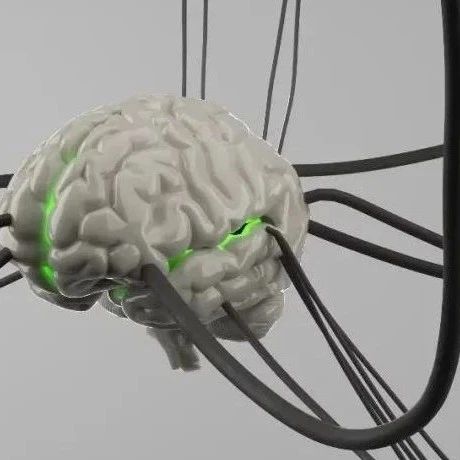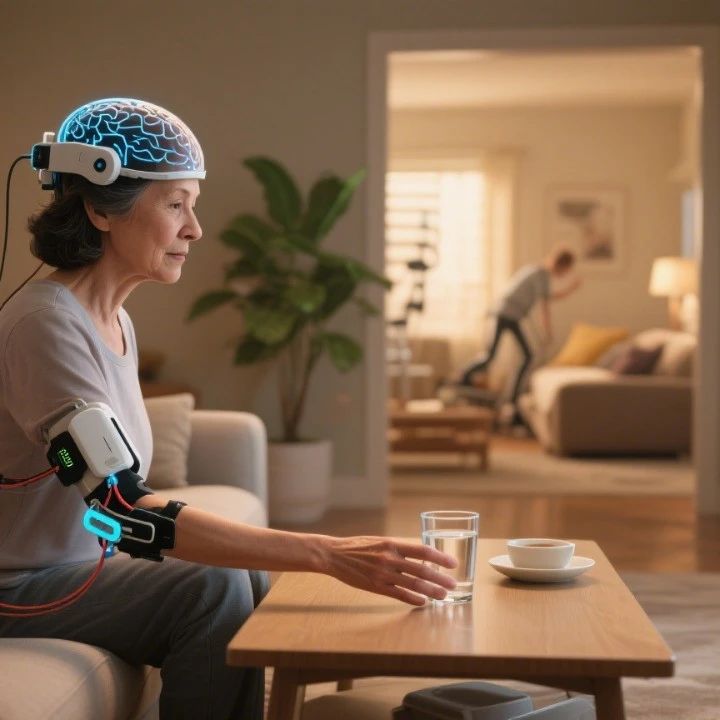CNN报道:“北脑一号”智能脑机系统比肩世界前沿
- 2025-07-22 09:31:44



“我想吃饭”——看似简单的四个字,却是从一位因渐冻症(ALS)导致言语障碍的67岁患者脑中“跃”上屏幕的! 这并非电影场景,而是国产“北脑一号”智能脑机系统带来的真实突破:硬币大小的无线设备植入患者大脑,成功解码其脑电信号并转化为中文文字,并展现出令人振奋的高精准度——出院前62词解码准确度可达63%,能解码输出近百个常用语句。

“北脑一号”智能脑机系统无线体内机,尺寸仅硬币大小。图片来源:CNN
脑机接口技术最早于20世纪70年代出现在美国。相比之下,中国在该领域的研究起步稍晚,但攻坚步伐正快速逼近国际先进水平。在北京脑科学与类脑研究所、北京芯智达神经技术有限公司的联合攻关下,在柔性电极、解码算法、设备集成等方面展现出强劲的技术追赶与创新能力。截至目前,“北脑一号”智能脑机系统已实现5例人体植入,成功帮助言语、运动障碍患者“用想象说话”、“用意念行走”。
“北脑一号”临床进度已与马斯克Neuralink公司持平。尽管两者在植入方式、信号精度及适用场景上路径不同,但“北脑一号”正逐步在安全性与实用性之间找到独特平衡,成为国内自主脑机技术崛起的重要标志。下一步,团队计划在未来一年为50至100名新增患者进行植入。
北京时间7月21日上午,美国有线电视新闻网(CNN)就“北脑一号”智能脑机系统最新进展进行深度报道。在这场面向未来的科技竞赛中,中国方案正快速走上国际舞台。


⬇ CNN报道全文 ⬇
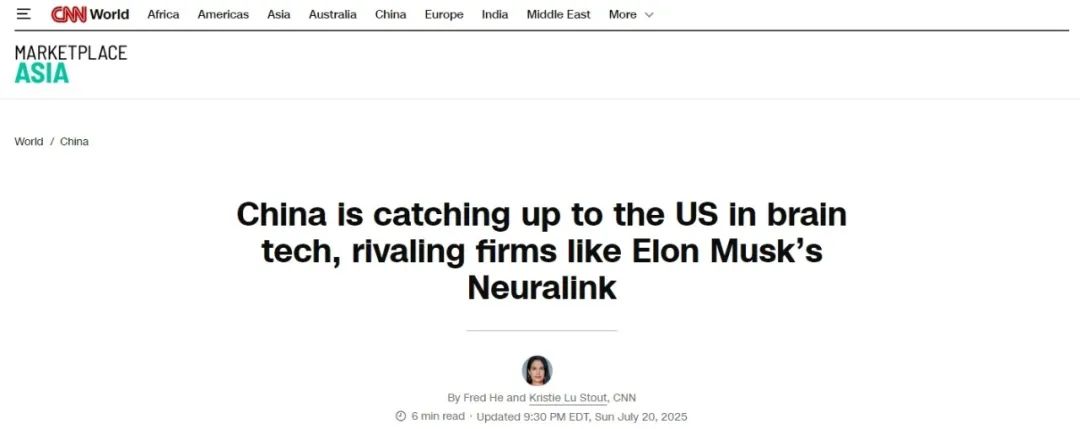
China is catching up to the US in brain tech, rivaling firms like Elon Musk’s Neuralink
By Fred He and Kristie Lu Stout, CNN
“I want to eat” popped up in Chinese characters on a computer at a public hospital in central Beijing. The words were formed from the thoughts of a 67-year-old woman with amyotrophic lateral sclerosis (ALS), also known as Lou Gehrig’s Disease, who is unable to speak.
The demonstration, captured on video in March by Beijing Radio and Television Station, was part of a clinical trial involving five patients implanted with a coin-sized chip called Beinao-1, a wireless so-called brain computer interface (BCI) – a technology led by scientists in the US, but in which experts say China is quickly catching up.
Luo Minmin, director of the Chinese Institute for Brain Research, Beijing(CIBR) and the chief scientist behind the trial, said there was a “very strong” need for BCI technology, saying they had been “overwhelmed” by requests from potential patients.
“The patients were saying that this feels so great, like they can gain or regain the control of (their) muscles,” he told CNN in May during a rare interview at his lab, located an hour’s drive away from Beijing Xuanwu Hospital, where the trial took place.
Luo said the technology was showing “high accuracy” in decoding signals from the brains of patients and translating the signals into text speech or machine movements. His team is planning to speed up human trials by implanting chips into 50 to 100 more patients over the next year.
“We are hoping that we can move this process faster,” he said. “If it’s proven to be safe and effective … it can be used clinically across the world.”
As of May, Beinao-1 says a total of five patients, the same number as Elon Musk’s Neuralink, has its implants. Another US company Synchron, whose investors include Jeff Bezos and Bill Gates, has undergone trials with 10 patients, six in the United States and four in Australia.
Maximilian Riesenhuber, a professor of neuroscience at Georgetown University who was not involved in the Beinao trials, told CNN that despite starting later than the US, China is making advances.
“China has definitely shown the ability to not just catch up, but also then be competitive, and now actually to start, also to drive the field in some areas,” he said. “Excitingly, there’s a lot of research activities in both countries, because they’ve realized the potential in BCI.”
According to Precedence Research, a market research firm, the market for brain technology was worth about $2.6 billion last year and is expected to rise to $12.4 billion by 2034. But for both China and the US, this technology is about much more than cash.
A different approach
CIBR was jointly founded by the Beijing municipal government and several local universities in 2018, about two years after Elon Musk founded Neuralink near San Francisco.
In 2023, CIBR incubated a private company named NeuCyber NeuroTech to focus on brain tech products such as Beinao-1. Luo, who is also the startup’s chief scientist, gave CNN rare access to the institute in May.
For years, he said, the ALS patient, who is in her 60s, was unable to express herself.
“She’s awake, she knows what she wants but she could not speak out,” said the scientist, who got his PhD in neuroscience from the University of Pennsylvania and spent nearly a decade in the US. “Following the implantation, she can now speak simple sentences quite accurately via the system.”
All BCI researchers must address the balance between risk and effectiveness.
Riensenhuber said most American firms use the more invasive method to place chips inside the dura mater, an outer layer of tissue that covers and protects the brain and spinal cord, in order to capture better signal. But these methods require riskier surgeries.
“It is interesting to see that NeuCyber is apparently able to get enough information even through the dura to allow the decoding of specific words,” he said.
The test on the ALS patient, which began in March, marked the Beinao-1 chip’s third trial in humans. Those trials made up what the developers described in a press release as “the world’s first batch of semi-invasive implantation of wireless BCI in human brains.” As of May, two more trials have been conducted, for a total of five.
Brain computer interface technology first started in the 1970s in the US.
Decades later, the Obama Administration launched its “Brain Initiative” in 2013, investing more than $3 billion to fund over a thousand neuroscience technology projects since, according to the National Institute of Health.
Synchron, based in New York, was the first firm to start human trials in July 2021. Three years later, a new BCI system developed at UC Davis Health translated the brain signals of an ALS patient into speech, achieving an accuracy of 97% – the most accurate system of its kind, the university said in a statement. The same year, Musk’s company completed its first human trial, enabling the participant to control a computer mouse with a brain implant.
China got its start in brain tech only in the 1990s, but it’s advancing fast. In 2014, Chinese scientists introduced the idea of a national project on brain tech to match similar efforts in the US and Europe, according to the Ministry of Science and Technology. Two years later, brain tech was mentioned in the country’s five-year plan, which outlines China’s national priorities and goals.
“Brain science is new in China,” said Lily Lin, a former research assistant at one of China’s top neuroscience research units from 2021 to 2023. “So, it started a bit late, but its speed of development has been faster than other countries. And the country has given a lot of funding to many scientific research units, and this funding is increasing every year.”
Last year, the government issued its first ethical guidelines for research in this area. At the local level, municipal governments in Beijing, Shanghai and other major cities have also offered support for brain technology companies from research and clinical trials to commercialization.
Riesenhuber and other researchers from Georgetown University published research on China’s BCI development in 2024, stating that efforts from Chinese researchers were “comparable in sophistication” to those in the US and the United Kingdom.
“We found China’s non-invasive BCI research to be comparable with that of other scientifically advanced nations and to be working to overcome obstacles to greater fidelity, throughput, and wider use,” according to the issue brief. “China’s invasive BCI research, while historically behind its non-invasive efforts, has picked up the pace and is approaching global standards of sophistication.”
Luo, who has worked in both countries, says the US is the “front-runner” in both invasive and non-invasive brain tech. But, comparing Beinao-1 and Neuralink is like looking at “apples and oranges,” he added.
The two systems differ not only in implant location but also in the type of brain signals recorded, as well as the method of data transmission. The Chinese chip records a wider range of brain areas, with lower precision for each neuron.
“All in all, I don’t think these two products are in a competitive or exclusive relationship,” Luo added. “The jury is still out, and we don’t know yet which route will ultimately benefit patients better.”
仅用于学术分享,若侵权请留言,即时删侵!
欢迎加入脑机接口AI星球,获取更多脑机接口+AI等领域的知识和资源。
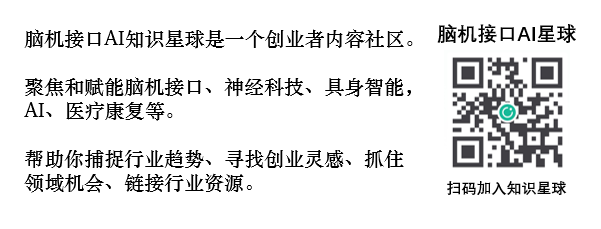
合作咨询请添加微信:RoseBCI【备注:姓名+行业/专业】。
欢迎来稿
1.欢迎来稿。投稿咨询,请联系微信:RoseBCI
点击投稿:脑机接口社区学术新闻投稿指南
2.加入社区成为兼职创作者,请联系微信:RoseBCI
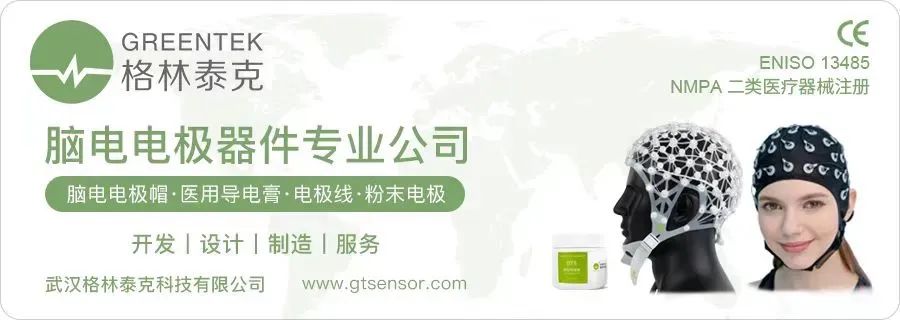

一键三连「分享」、「点赞」和「在看」
不错过每一条脑机前沿进展
 扫码添加微信
扫码添加微信
- 点赞 (0)
-
分享
微信扫一扫
-
加入群聊
 扫码加入群聊
扫码加入群聊










